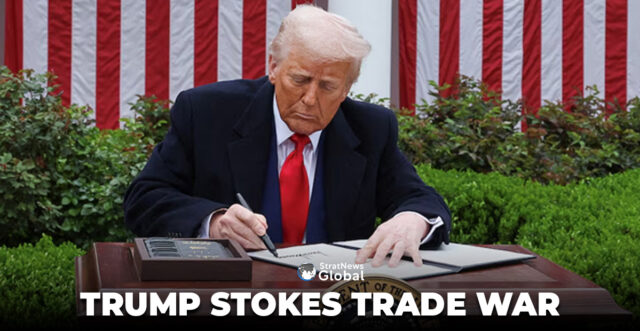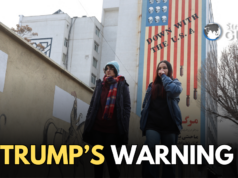U.S. President Donald Trump‘s decision to impose broad tariffs on U.S. imports triggered threats of retaliation on Thursday, as businesses and governments scrambled to assess the impact of an intensifying trade war that could disrupt global alliances.
The penalties announced on Wednesday unleashed turbulence across world markets and drew condemnation from other leaders facing the end of an era of trade liberalisation that has shaped the global order for decades.
Donald Trump said he would impose a 10% baseline tariff on all imports to the United States and higher duties on some of the country’s biggest trading partners, hammering goods from premium Italian coffee and Japanese whisky to sportswear made in Asia.
According to Fitch Ratings, the new U.S. tariffs are the highest in more than a century.
As investors digested the news on Thursday, stock markets in Beijing and Tokyo sank to multi-month lows. European shares were also down sharply in morning trade, with top goods exporter Germany hit hard.
Wall Street futures sank as investors shed riskier assets in favour of safe-haven bonds and gold.
Germany’s IW research institute estimated the tariffs would wipe 750 billion euros ($833.63 billion) from the EU economy.
Trump said the “reciprocal” tariffs were a response to duties and other non-tariff barriers put on U.S. goods. He argued that the new levies will boost manufacturing jobs at home.
Facing 54% tariffs on exports to the U.S., the world’s No. 2 economy, China vowed countermeasures, as did the European Union, as Washington’s allies and rivals alike criticised moves they fear will deal a devastating blow to global trade.
“Uncertainty will spiral and trigger the rise of further protectionism. The consequences will be dire for millions of people around the globe,” EU chief Ursula von der Leyen said, adding the 27-member bloc was preparing to hit back if talks with Washington failed.
U.S. Treasury Chief Scott Bessent earlier warned any retaliatory moves would only lead to escalation.
Tiny Territories, Uninhabited Islands Hit
Among close U.S. allies, the European Union was targeted with a 20% rate, Japan with 24%, South Korea with 25% and Taiwan with 32%. Even some tiny territories and uninhabited islands in the Antarctic were hit by tariffs, according to a list posted by the White House on X.
Donald Trump’s tariffs also looked set to shake up established trade ties in favour of new relationships.
“Opportunities for new alliances are emerging that we should use determinedly and decisively,” said Robert Habeck, the economy minister of Germany, whose biggest trading partner is the United States.
Recent meetings showed “that what we think is what they think, too: forging an alliance, for example, with Canada and Mexico, is the order of the day,” he said, adding “we, the European Union, should pragmatically explore free trade options with other countries.”
Trump’s tariffs come at a time when relations with much of Europe have plummeted over issues such as the war in Ukraine and the upending of decades-old transatlantic ties, with the U.S. acting as the ultimate guarantor of European security.
The issue spilled over into a meeting of the NATO alliance in Brussels on Thursday, where the U.S. is pushing for countries to sharply raise their defence spending.
Norway’s Foreign Minister Espen Barth Eide said NATO’s founding after World War Two was based on countries not using “coercive” economic measures against one another, while German, French and Belgian foreign ministers also criticised the tariffs.
Anthony Albanese, prime minister of Australia, a nation often described as America’s “deputy sheriff” in Asia, said Trump’s move was not the act of a friend.
“The (Trump) administration’s tariffs have no basis in logic and they go against the basis of our two nations’ partnership.”
Outside economists have warned that tariffs could slow the global economy, raise the risk of recession, and increase living costs for the average American family by thousands of dollars.
“This is how you sabotage the world’s economic engine while claiming to supercharge it,” said Nigel Green, CEO of global financial advisory deVere Group. “The reality is stark: these tariffs will push prices higher on thousands of everyday goods – from phones to food – and that will fuel inflation at a time when it is already uncomfortably persistent.”
Canada and Mexico, the two largest U.S. trading partners, already face 25% tariffs on many goods and will not face additional levies from Wednesday’s announcement.
They will be hit by a separate set of tariffs on auto imports that Trump announced last week will take effect starting on Thursday.
Tariff concerns have already slowed manufacturing activity across the globe, while also spurring sales of autos and other imported products as consumers rush to make purchases before prices rise.
Now as the reality of the new tariffs sinks in, companies around the world must weigh up how to adjust, with their options limited and unpalatable for their customers.
“It’s an immense difficulty for Europe. I think it’s also a catastrophe for the United States and for U.S. citizens,” said French Prime Minister François Bayrou.
($1 = 0.8997 euros)
(With inputs from Reuters)





